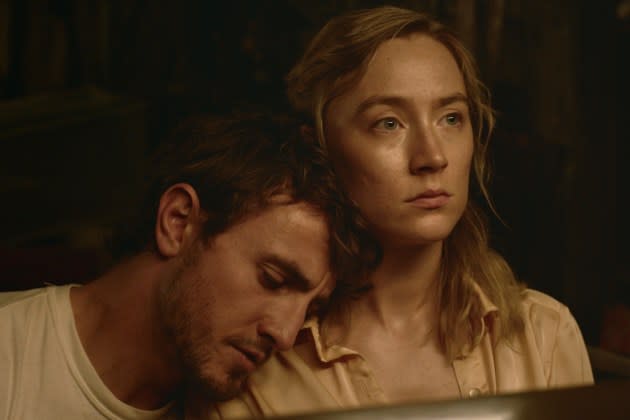‘Foe’: No Film With Paul Mescal and Saoirse Ronan Should Be This Boring

You have an Oscar-nominated actor who’s played everything from queens to killing machines. You’ve paired her with a performer who is arguably the hottest, most in-demand next-gen leading man of the moment. The source material is the second novel from an acclaimed writer, whose first book (I’m Thinking of Ending Things) was one of the more intriguing page-to-screen adaptations in years. He co-wrote the screenplay with the director, whose previous work on Lion (2016) and the limited series Top of the Lake (2013) suggests he knows how to helm left-of-center journeys both accessible and moving. The story involves the moral dilemma around developing artificial intelligence and how climate change is destroying our planet, which means it could not be more timely or thematically urgent. And all of it is wrapped in an intimate psychological drama involving three people that still manages to hit a number of tried and true sci-fi beats.
In other words, what you’ve got here is something that should be, by most metrics, what the kids call one humdinger of a motion picture. A real go-for-broke, food-for-thought, edge-of-your-seat kind of deal. The sort of high-pedigree prestige project designed to delight Oscar prognosticators and genre nerds alike. Which is why the question you’re left with after watching Foe feels so disorienting and confusing: This is a film that seems to have everything in its right place, so why the hell is it so listless, so lifeless, so damn boring?
More from Rolling Stone
These Are the Early October Prime Day Deals Actually Worth Buying
October Prime Day 2023 Streaming Deals: What to Expect From Prime Video
You can’t blame the stars, who seem to be coloring in their sometimes cryptic characters as much as they can, and fleshing out the central relationship and love triangle (we’ll get back to this aspect in a second) in a way that adds a human element to the hot-button issues being tossed around. Henrietta (Saoirse Ronan) lives in the rural outback of the American Midwest with her husband, Junior (Paul Mescal). Their farm isn’t much to speak of, since in the year of our lord 2065, our once fertile big blue marble has become a desolate wasteland. Still, it’s home, at least for now. There’s been a lot of talk about the government relocating its citizens to another colonized planet.
In fact, that already-in-progress plan is why a stranger named Terrance (The Underground Railroad‘s Aaron Pierre) has shown up at their house in the middle of the night. He’s come to them with an offer they can’t refuse. A lottery has pulled up their names for an interstellar upgrade. There’s a catch, however. Only Junior has technically been chosen to live on a space station for two years and help prepare Earth’s population for permanent residency elsewhere.
Neither he nor Hen are exactly thrilled about him being gone from home — and their home planet — for years. But not to worry, says Aaron. The powers that be have “a duty of care to those left behind.” Translation: They’ve developed “simulants” (that word again) as lifelike as you can imagine. These more-human-than-human bots can be customized to resemble a loved one, right down to the scars they’ve had since childhood, and can be programmed to match the exact personality of an absent spouse. This faux-Junior will keep Hen company until it’s time for him to go. In the meantime, Aaron will stick around, conducting daily interviews with the man of the house so they can gin up a suitable replacement.
Something about Hen seems off the second that Aaron shows up, however, and if you’ve read Iain Reid’s book, you know why. The secret of Foe, which made its premiere at the New York Film Festival, will only seem obvious in hindsight, and it’s to both Ronan and Mescal’s credit that the two of them establish a rapport that benefits the heart of the story, and not its twists and turns. Yet there’s still a curious lack of a pulse running beneath this science-fiction parable, despite the work of these two extraordinary actors. (If nothing else, it’s proof that Ronan improves virtually everything 33.3% by her presence alone.) Director Garth Davis has a knack for filming long shots of large, barren vistas with a beguiling amount of negative space, yet the film never feels like it quite gets out of first gear; you’re still wondering when the movie is actually going to start even once you’re past the halfway point.
You may remember us mentioning a “love triangle” earlier, and while there’s definitely one percolating ever so gently, it’s not the one you think. And it’s through that prism that the movie begins to reveal what it’s really about, in terms of tackling some thornier, more philosophical issues. We’ve established that androids do dream of electric sheep — but how does their programming handle matters of a more existential and emotional nature? Yet even that chin-stroking query can’t quite light a spark underneath this love story filtered through a lens darkly. Foe knows the tale it wants to tell. But because of the often mannered, occasionally stagy way that it ends up telling it, this is a movie that has a tendency to be its own worst enemy.
Best of Rolling Stone